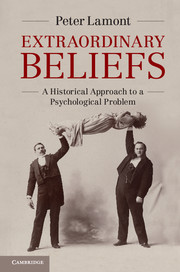Book contents
- Frontmatter
- Contents
- A brief reflexive preface
- Acknowledgements
- ONE Introduction
- TWO The making of the extraordinary
- THREE The making of mesmeric phenomena
- Four The making of spiritualist phenomena
- FIVE The making of psychic phenomena
- SIX The making of paranormal phenomena
- SEVEN The making of extraordinary beliefs
- Notes
- Bibliography
- Index
ONE - Introduction
Published online by Cambridge University Press: 05 April 2013
- Frontmatter
- Contents
- A brief reflexive preface
- Acknowledgements
- ONE Introduction
- TWO The making of the extraordinary
- THREE The making of mesmeric phenomena
- Four The making of spiritualist phenomena
- FIVE The making of psychic phenomena
- SIX The making of paranormal phenomena
- SEVEN The making of extraordinary beliefs
- Notes
- Bibliography
- Index
Summary
Observations on an extraordinary feat
An extraordinary thing happened…in front of a crowd of strangers, a man asked a woman to think of a word. He asked her to concentrate on the word, and then he looked into her eyes. After a moment or two, he began to speak: it was a word of about six or seven letters, a name, no, an object, and there was a T in the middle, no, there were two. There were two Ts in the middle. She nodded. Don't nod, don't give me any feedback, just concentrate. It's a small thing, not so small, but small in a sense. It's alive, it's an animal, it's a pet and it's very cute. You're thinking of a kitten! She stared at the man. The strangers, who had been staring at him, turned to stare at her. They could tell, simply from the expression on her face, that he had read her mind.
Perhaps this was a magic trick, though it is hard to imagine how it could have been done. The woman was asked to think of any word she wanted, and nothing was said or written down. In any case, there was a magician present, and he said that he could not explain how it was done. Some thought it was the result of clever psychological techniques, of reading subtle facial cues. After all, anyone could tell from her facial expression that the man had read her mind, so perhaps he was able to pick up on more subtle information? However, there was also a psychologist present, and she was certain that psychological techniques could not account for the demonstration. If it was neither trickery nor psychology, then surely, as others thought at the time, this was a genuine paranormal demonstration? Of course, you were not there, and are understandably sceptical. Nevertheless, the description is accurate, since I was there myself, and saw this (with my own eyes, as all competent observers should). You have my word.
- Type
- Chapter
- Information
- Extraordinary BeliefsA Historical Approach to a Psychological Problem, pp. 1 - 33Publisher: Cambridge University PressPrint publication year: 2013



